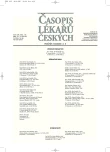Stem Cells, Stem Cell Therapy, and Ethical Problems of Medicine
Kmenové buňky, buněčná terapie a etické problémy medicíny
Společným jmenovatelem mnoha filozofických přístupů k problému užití lidských embryí v medicíně je konstatování: „Jde o plnohodnotný lidský subjekt, který si zaslouží úctu jako dospělá bytost a lidská osoba“. Má již definovanou identitu, v níž počíná vlastní koordinovaný postupný vývoj. Není tedy jednoduchým shlukem buněk. Integrita či holistické vlastnosti nové kvality celku buněk, které tvoří ranné embryo, nejsou skutečně shlukem předembryonálních „stavebních“ částí, sumou buněk apod. Mají svůj vývoj, inherentně v sobě předem zakódovaný, nikoliv však přísně deterministicky předurčený. Jinými slovy, sama autointegrita vývoje, inherence části predeterminace evoluce embrya není celkem, který je schopen následných efektů „sám“. Lidský plod od prvního okamžiku, než se stane úctyhodnou lidskou bytostí, prodělává celou řadu kvalitativních (různě externě a interně determinovaných) proměn. Lze konstatovat, že medicína dospívá, jako již nejednou, do stadia, kdy „nevystačí“ či nemůže se spoléhat jen na osvědčené, „z minulosti proudící“ axiologické hodnoty, etické normativy či vypěstovaný morální cit svých subjektů i lidských objektů. Nemá jinou alternativu své přítomnosti než aktivním interdisciplinárním filozoficko–biologickým, filozoficko–medicínským zaujetím a zkoumáním – axiologických, etických a morálních otázek a problémů a jejich ověřeným a obezřetným uplatňováním – evolucionizovat i v této dimenzi. Článek se zabývá hledáním některých způsobů formování etiky terapeutického užití kmenových buněk.
Klíčová slova:
kmenové buňky, buněčná terapie, embryonální kmenové buňky, dospělé kmenové buňky, etika, biotika.
Authors:
I. Hruška 1; S. Filip 2
Authors‘ workplace:
Ústav filozofie a společenských věd, Fakulta humanitních studií, Univerzita Hradec Králové
1; Klinika onkologie a radioterapie LF UK a FN, Hradec Králové
2
Published in:
Čas. Lék. čes. 2007; 146: 440-443
Category:
Review Article
Overview
Common denominator of many philosophic approaches to the problem of using human embryos in medicine is the statement that it is „a full-value human subject that deserves respect as an adult human being“. It has a defined identity in which it starts its own coordinated gradual development. Therefore, it is not just a simple cluster of cells. Integrity or holistic properties of a new quality of cells that, as a whole, represent an early embryo, and in fact are not a cluster of pre-embryonic „structural“ parts or a sum of cells etc. They have theirs own evolution, previously inherently encoded, but not precisely predestined. In other words, only autointegrity alone in evolution, inherence as a part of predetermination in evolution of embryo, is not able to exist as a unit „alone“. Human foetus since the first moments of its existence goes through many qualitative (externally or internally determined) transformations before it becomes a respectable human being. It is possible to say that medicine, as many times before, is now coming to a stage when axiologic values, ethical directives or moral feelings of its subjects and human objects proved in the past, are no more relevant at present. Therefore, medicine has no other alternative than an active approach to study this problem from all philosophical, biological and medical aspects to evolutionize itself in this new dimension. In this paper some of these questions are discussed and some ways of forming the ethics in therapeutic use of stem cells are presented.
Key words:
stem cells, stem cell therapy, embryonic stem cells, adult stem cells, ethics, bioethics.
Labels
Addictology Allergology and clinical immunology Angiology Audiology Clinical biochemistry Dermatology & STDs Paediatric gastroenterology Paediatric surgery Paediatric cardiology Paediatric neurology Paediatric ENT Paediatric psychiatry Paediatric rheumatology Diabetology Pharmacy Vascular surgery Pain management Dental HygienistArticle was published in
Journal of Czech Physicians

- Advances in the Treatment of Myasthenia Gravis on the Horizon
- Possibilities of Using Metamizole in the Treatment of Acute Primary Headaches
- Metamizole at a Glance and in Practice – Effective Non-Opioid Analgesic for All Ages
- Metamizole vs. Tramadol in Postoperative Analgesia
- Spasmolytic Effect of Metamizole
-
All articles in this issue
- Bioequivalence Studies of Pharmaceutical Preparations
- Cognitive Functions Impairment in Diabetes Mellitus Patient
- Stem Cells, Stem Cell Therapy, and Ethical Problems of Medicine
- Present View on the Spinal Haemangioma
- Phototoxic Reaction After the Systemic Administration of Antimicrobial Drugs
- Problems of Regulation of Breathing
- Conjugated Linoleic Acid – The Dietary Supplement in the Prevention of Cardiovascular Diseases
- Transcription Factor Egr-1 in Cardiovascular Biology
- Incidence, Diagnostics and Therapy of the Lung Cancer in the Czech Republic in 2003
- Study of the Eosinophilic Inflammation Activity in Bronchial Asthma
- Composition of the Nonesterified Fatty Acids and Lipid Peroxidation in Metabolic Syndrome
- Prospects of Body Composition Analysis by Bioimpedance Method in Children
- The Assessment of Body Composition in Patients with Thyroid Dysfunction
- Is Prescription of Physical Activity a Part of Health Care in Civilization Disorders? Results of Questionnaire Study in Medical Doctors
- Stress Cardiomyopathy
- Journal of Czech Physicians
- Journal archive
- Current issue
- About the journal
Most read in this issue
- Bioequivalence Studies of Pharmaceutical Preparations
- Study of the Eosinophilic Inflammation Activity in Bronchial Asthma
- Stress Cardiomyopathy
- Is Prescription of Physical Activity a Part of Health Care in Civilization Disorders? Results of Questionnaire Study in Medical Doctors
